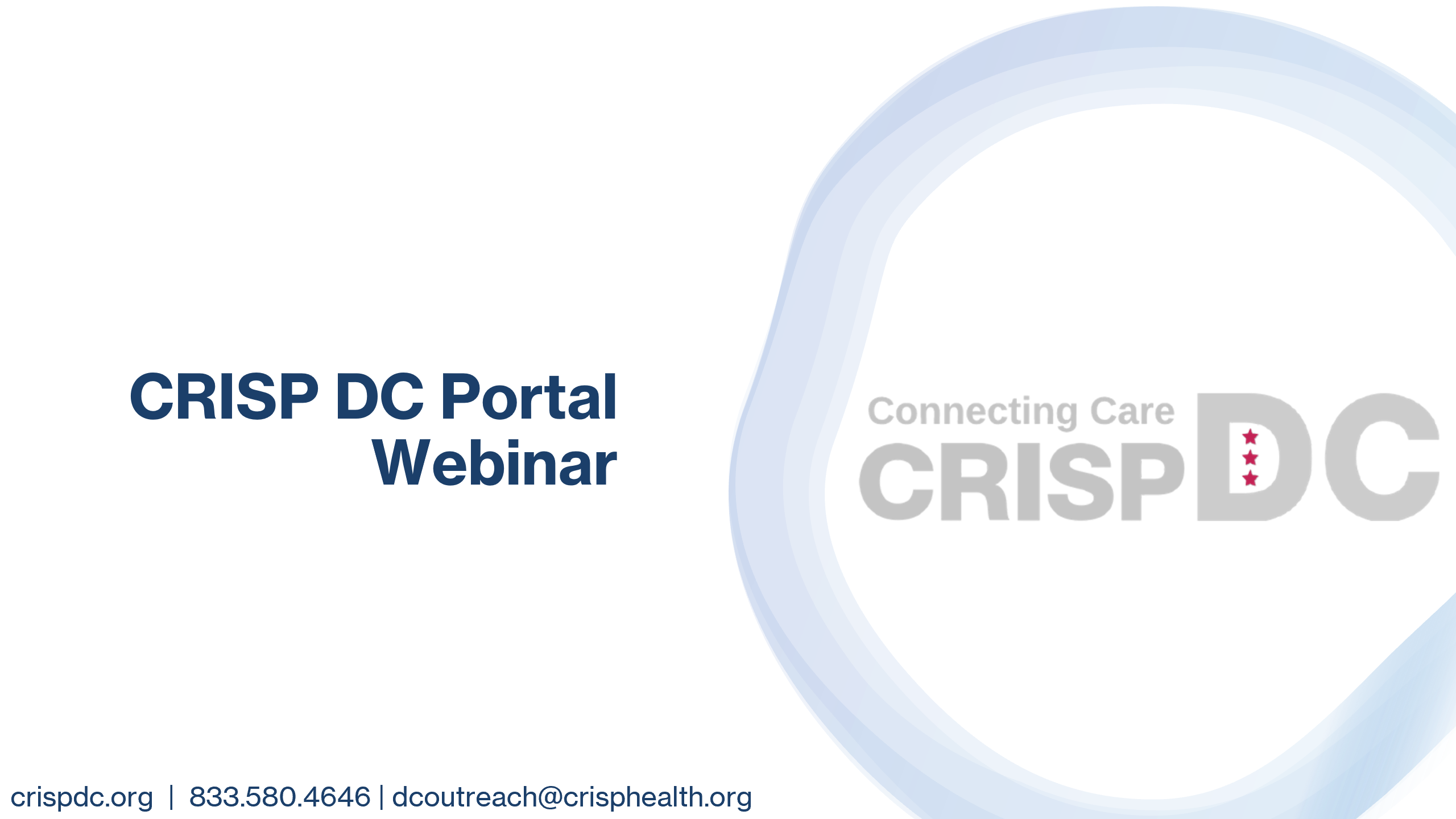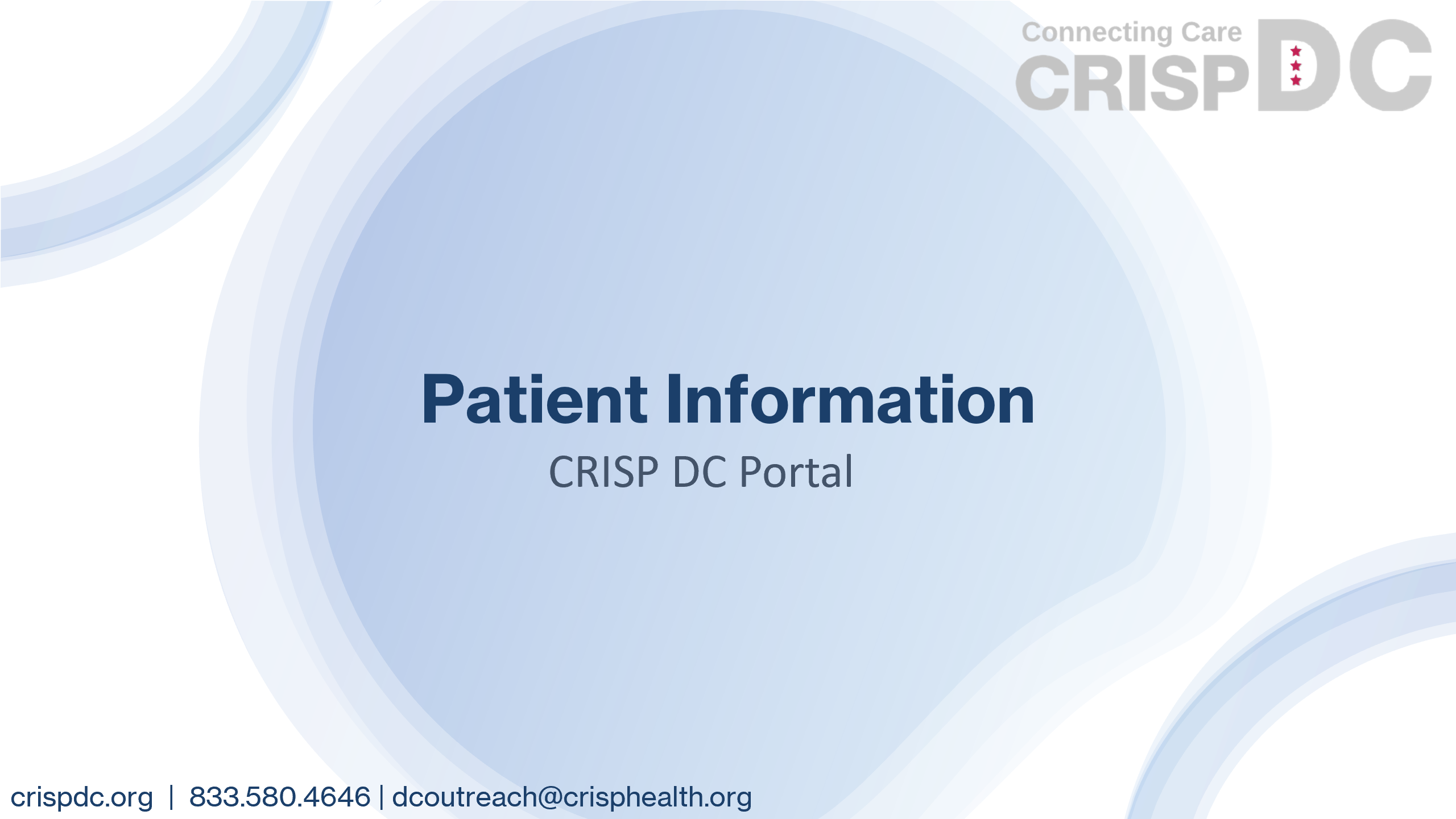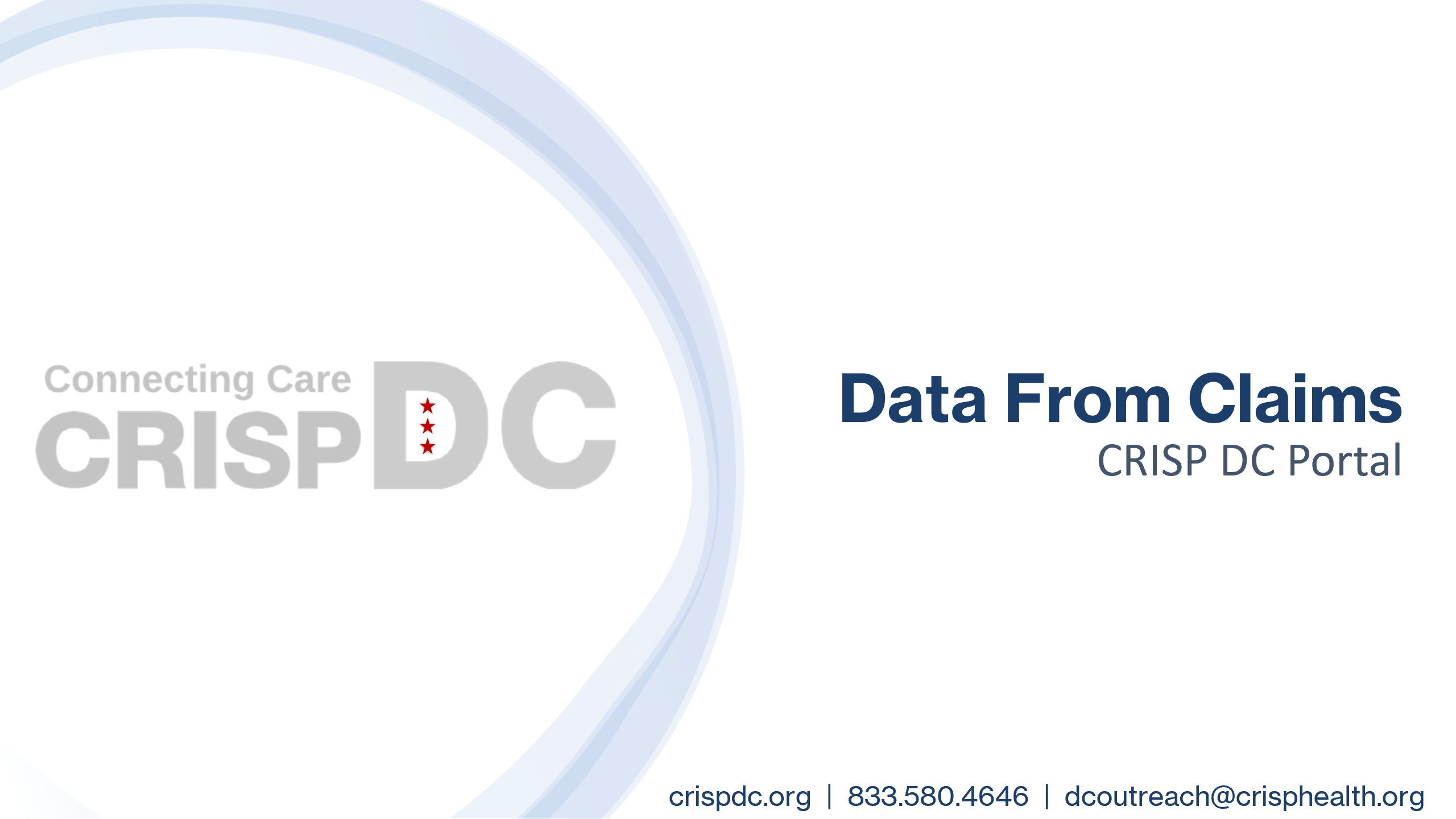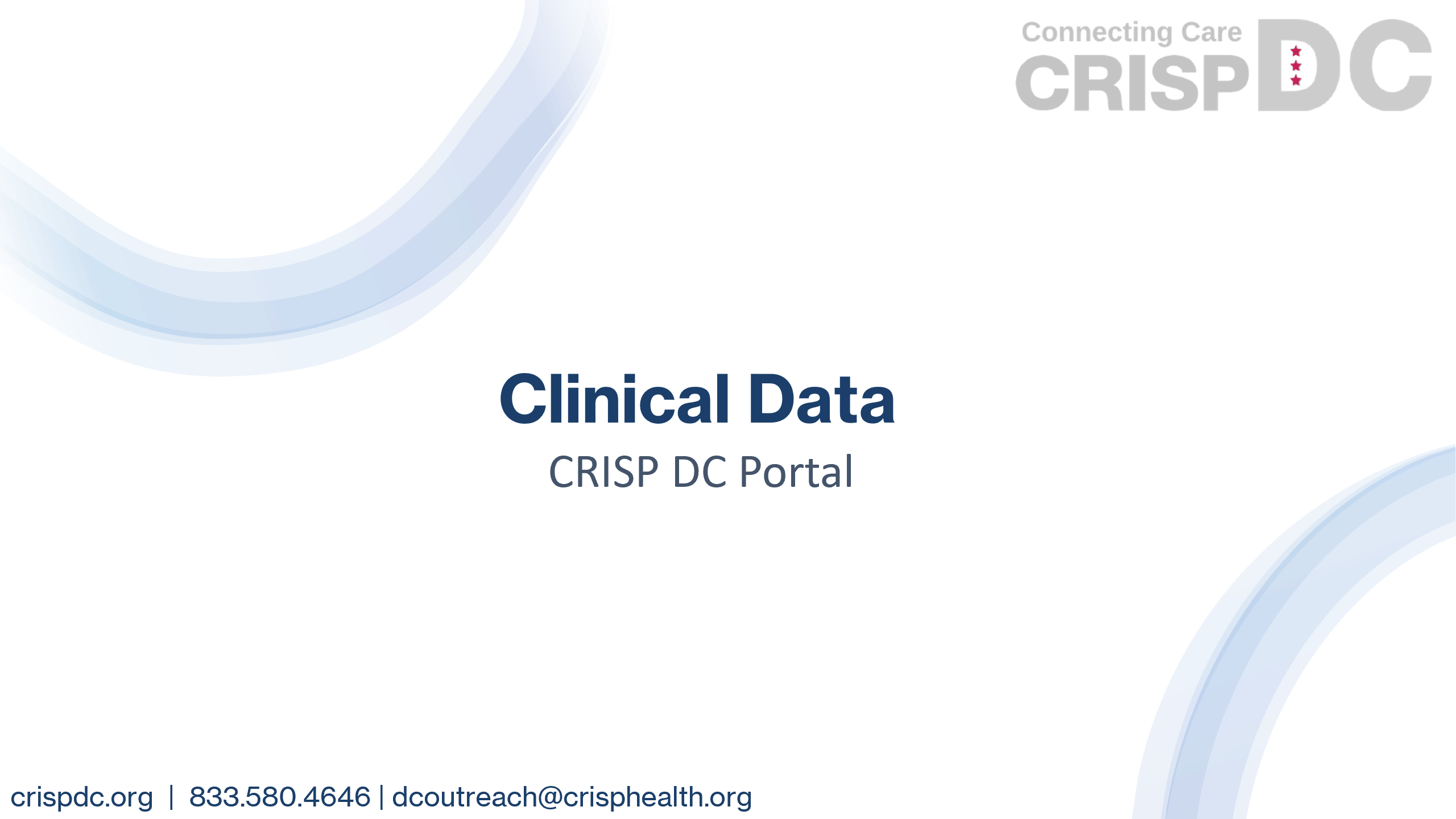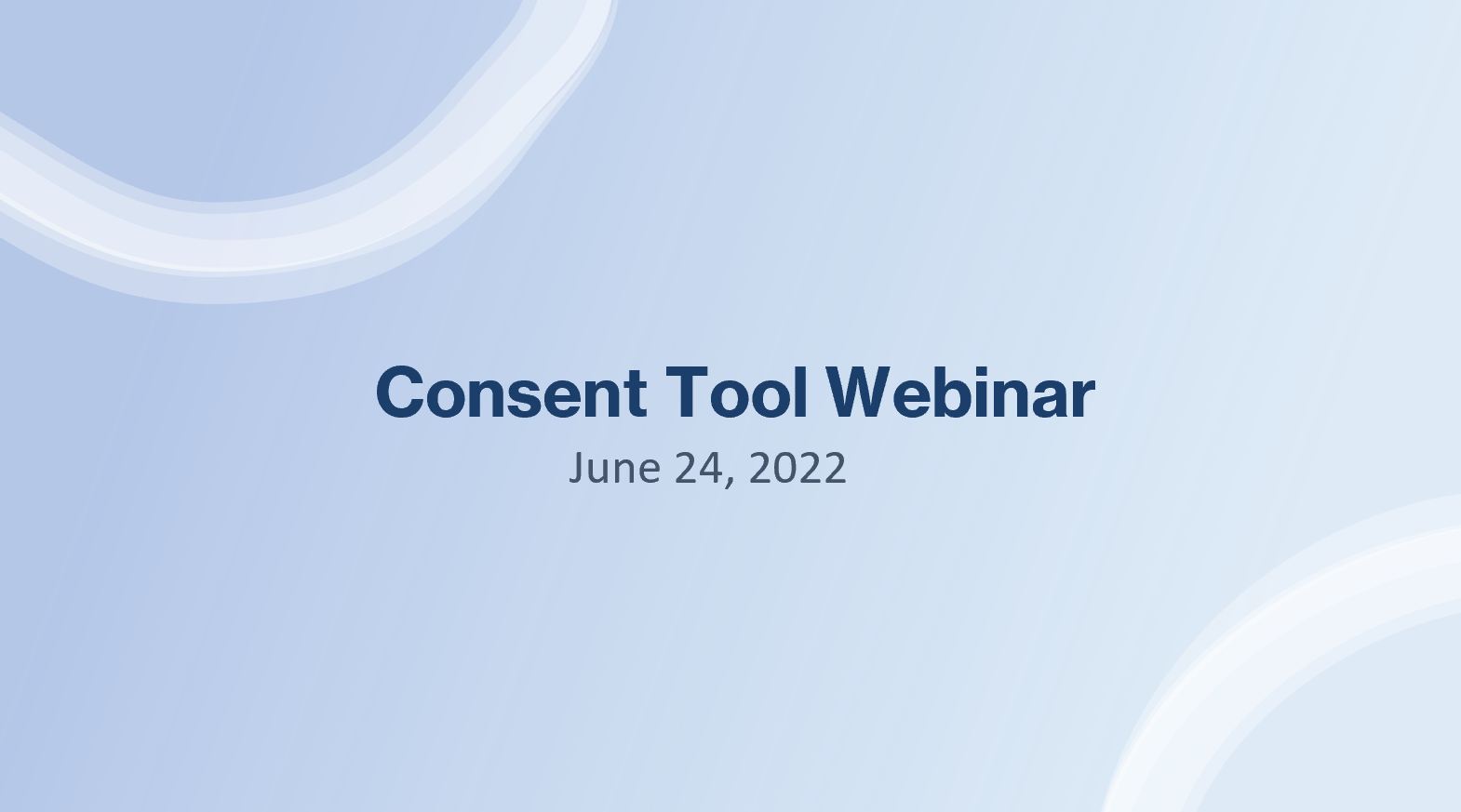Use Data to Improve Care
In order to get started using the DC Portal, an organization must sign a CRISP Participation agreement and must update its Notice of Privacy Practices documents. If your organization has already signed a participation agreement, you will be able to skip this step during the onboarding process.
The participation agreement is the uniform data sharing agreement signed by every organization that participates in CRISP. It ensures that everyone sharing data follows the same rules and regulations.
Video Library
Partner with CRISP DC
Getting started
In order to get started using the CRISP portal, an organization must sign a CRISP Participation Agreement for single sites or an agreement for organizations with multiple sites and must update its Notice of Privacy Practices documents.
The participation agreement is the uniform data sharing agreement signed by every organization that participates in CRISP. It ensures that everyone sharing data follows the same rules and regulations.
Updating your NPP ensures that your practice does its part to inform patients about how CRISP is being used to deliver and coordinate care and informs them of the right to opt out.
Organizations must have CRISP Opt-Out Forms on site to distribute to patients who ask for one. They must also maintain copies of the Patient Factsheets in registration areas.
Requirements to Participate
An organization must:
- Submit LabCorp/Quest Data Release Form if it wishes to make its results available in CRISP.
- Send a patient panel (all patients seen within the last 18 months) using DIRECT secure email to panelupload@crispdirect.org. This patient list will be used to audit your organization’s future activity to help ensure appropriate use. Here is a sample Patient Panel.
In order to send us your panel, please email support@crisphealth.org to request a DIRECT secure email address.
- CRISP Participant Privacy Awareness Best Practices
As a participant of CRISP, you have agreed to educate patients on their rights to share information through CRISP. Below is a review of the Patient and Privacy Awareness Best Practices that should be implemented prior to using CRISP services.
- Update your organization’s Notice of Privacy Practices (NPP) document and email support@crisphealth.org, fax to CRISP at 443-817-9587, or email your CRISP outreach representative prior to utilizing the HIE services.
- Provide updated NPP to all patients annually.
- Place Connected to CRISP poster in reception area.
- Place patient education materials in reception area.
- Make opt-out forms available to patients.
- Educate staff on CRISP services and patient request protocols for additional information Notify patients of their right to opt-out prior to reviewing their data in CRISP, or if you are following up on a recent hospitalization based on a ENS notification Create an internal policy to hold your organizations users responsible for misuse of data available in CRISP.
- Patient Education
All participant intake points will be required to make materials available to patients about CRISP and their option to opt-out of CRISP services (these should be in plain view for patient but don’t need to be given to each patient individually). Opting out of CRISP will apply to all services except the Prescription Drug Monitoring Program and Public Health reporting in accordance with state law.
After signing up with CRISP, your organization will receive the following materials:
- Patient opt-out forms (notify CRISP if you need a language other than English).
- Patient Guide to HIE informational flyer (notify CRISP if you need a language other than English).
- Opt Out
When a patient opts out of participation in the HIE, doctors and nurses will not be able to search for their health information through the HIE to use during treatment.
Additionally, information is not available for research. Physicians and other treating providers will still be able to select the HIE as a way to receive patient lab results, radiology reports, and other data sent directly to them that they may have previously received by fax, mail, or other electronic communications. Additionally, in accordance with the law, Public Health reporting, such as the reporting of infectious diseases to public health officials, will still occur through the HIE after the patient decides to opt out. Controlled Dangerous Substances (CDS) information, as part of the Maryland Prescription Drug Monitoring Program, will continue to be available through the HIE to licensed providers.
User Admin Portal
We launched the CRISP User Admin Portal. Every 90 days, we require the verification of each user within our system and perform regular compliance checks to ensure the security of all patient information. You are required to review all listed users from your organization to determine whether or not they should maintain access to CRISP tools. The User Admin Portal is a tool designed to allow authorized CRISP users to approve or deny access to CRISP tools for current users on your staff and add new users.
Click here to access the portal.
Point of Contact
A health care organization agrees to certain obligations when it enters into an agreement to participate with CRISP. The nature of the relationship between a participating organization and CRISP are spelled out in the CRISP Participation Agreement and its policies and procedures, which are regularly updated on our website.
Credentialing
As a designated Point of Contact (POC) for CRISP, your organization has asked you to be responsible for some or all of its obligations. Examples of which include:
- Verifying the employment or contractual status of an individual CRISP user and confirming that the user is permitted access to CRISP under the organization’s own policies and procedures.
- Notifying CRISP when an individual user is no longer employed by the organization or the user’s role has changed such that access to CRISP should be terminated.
- Providing and/or receiving a notice to CRISP in the event that an individual user has been found by the organization to have violated the terms of the CRISP participation agreement or any applicable laws.
- Receiving formal written notice of any changes to CRISP’s policies and procedures.
*There may be additional points of contact who will be required to approve user access to different CRISP applications once a user is provided with initial access.
Delegator
A delegator is ultimately responsible for and approves access to a patient’s clinical data for non-physicians/NPs. Confirms access to clinical data on their behalf upon user registration via e-mail. Must be a Nurse Practitioner or Physician (MD/DO).
Panel Upload
To ensure that CRISP accurately reflects your active patient roster, do not forget to share your patient panel at least every 90 days. We strongly encourage you to upload directly on the portal with the Self-Service Panel Loader or you can send it through Direct, SFTP file, ADT/SIU feed to CRISP. Please contact our outreach team at dcoutreach@crisphealth.org if you have any question about this process. Unfortunately, failure to submit timely panels may result in termination of user access to CRISP services.
Documents
- CRISP Participation and Direct Agreement- w Multi-Facility Form- FINAL1.24
- CRISP LabCorp and Quest Data Release Form
- SUD Consent Form – For Patients (ENGLISH)
- SUD Consent Form (SPANISH)
- CRISP Sample NPP Language for CRISP Participation
- Ambulatory Bulk User Load Sheet
- Go-Live Checklist for CRISP Services
- Sample Patient Panel
- Instructions on Uploading Patient Panels
- ENS Requirements Checklist v20 (with PROMPT)
- Sharing your SUD Treatment Data Through CRISP FAQs
- ENS Prompt Guide – Filters
- Panel Processor One Pager
- Panel Processor User Guide
- HIE Admin Guide
- CRISP DC PA Addendum Qualified Services Fillable PDF
- Image Exchange One Pager
- Notice of Privacy Practices
- Sharing your SUD Treatment Data Through CRISP FAQs
- CRISP Participation and Direct Agreement- w Multi-Facility Form- FINAL1.24
- CRISP LabCorp and Quest Data Release Form
- SUD Consent Form – For Patients (ENGLISH)
- SUD Consent Form (SPANISH)
- CRISP SUD Treatment Attestation Form – 10.8.2021
- CRISP DC Participation and Direct Agreement- Redline Final 6.21
- Sharing Your SUD Treatment Data Through CRISP- 3.25.2021
- CRISP DC Participation and Direct Agreement- w Multi-Facility Form- REV DRAFT 3.21-redline
- CRISP Proposes Amendments to the Participation Agreement- Memo
- CoRIE one-pager March 2021
- CBO Data Sharing Policy- DC – Final
- Consent Management Solution RFP Pricing Document
- Consent Management Solution RFP
- CRISP Sample NPP Language for CRISP Participation
- CRISP DC Behavioral Health Data Sharing FAQ for Providers
- Ambulatory Bulk User Load Sheet
- Go-Live Checklist for CRISP Services
- Sample Patient Panel
- Instructions on Uploading Patient Panels
- ENS Requirements Checklist v20 (with PROMPT)
- CRISP DC Behavioral Health Data Sharing FAQ for Patients
- Go-Live Checklist for CRISP Services
- AoD Request Form
- Opt-Out Form (English)
- Opt-Out Form (Spanish)
- CRISP DC User Guide
- ULP vs Portal Comparison
- Two-Factor Authentication User Guide
- DC Consent Tool External Newsletter One-Pager V3
- ENS Prompt Guide – Filters
- Panel Processor One Pager
- Panel Processor User Guide
- HIE Admin Guide
- CRISP DC PA Addendum Qualified Services Fillable PDF
- Image Exchange One Pager
- Notice of Privacy Practices
- Consent Tool User Guide
- Consent One-Pager
- Consent Incontext One-Pager
- Consent to Share SUD Information Flyer
- Lead Levels User Guide
Policies Pertaining to Usage of Patient Data
- Approved Use Case – Patient-Level Data for Vaccination Outreach
- Approved Use Case – Organ Procurement Organization Access to Clinical Information
- Approved Use Case – Local Health Department Access to Overdose Data
- Approved Use Case – Health Department Fatality Reviews
- Approved Use Case – Disease Investigation
- Approved Use Case – HIV Care Reengagement
- Approved Use Case – Family Reunification Portal
- Approved Use Case – Public Health Disease Reporting
- Approved Use Case – Public Health Access to Patient-Level Data for Vaccinations
- Approved Use Case – Closed Loop Referrals
- Approved Use Case – Clinical Guidance Notifications
- Approved Use Case – Encounter Notification System (ENS)
- Approved Use Case – Query Portal Access for Health Plans
- Approved Use Case – Policy Use of CRISP Services for Quality Improvement
- Approved Use Case – Use of Query Portal Access for Care Coordination
- Approved Use Case – BFRIEND Initiative
- Approved Use Case – Use of CRISP for EMS QA Initiatives – Pilot
- Approved Use Case – Cross Facility Patient Level Data Sharing Policy
- Approved Use Case – CQM Reporting Tool
- Approved Use Case – Cancer Registry Policy
- Approved Use Case – Encounter Reporting Policy
- Approved Use Case – Community Based Organization Data Sharing Policy
Patient Access
- Clinicians may send an HL7 message – CRISP DC integration engineers will work with each site that chooses to establish this method
- Clinicians may log into the CRISP DC portal and submit the Prevention of Harm Form using the Consent Tool – a detailed workflow with screenshots is available here.
